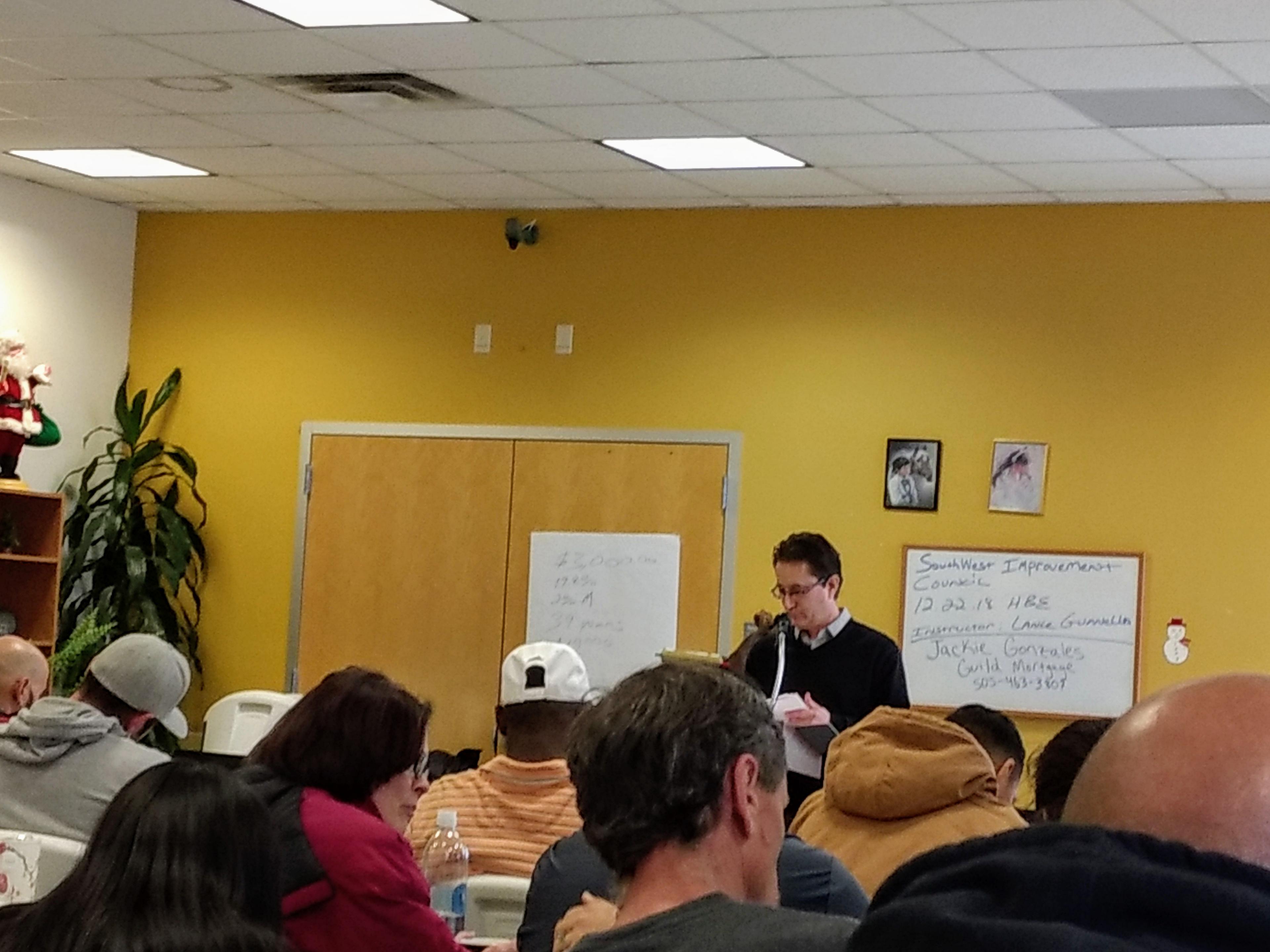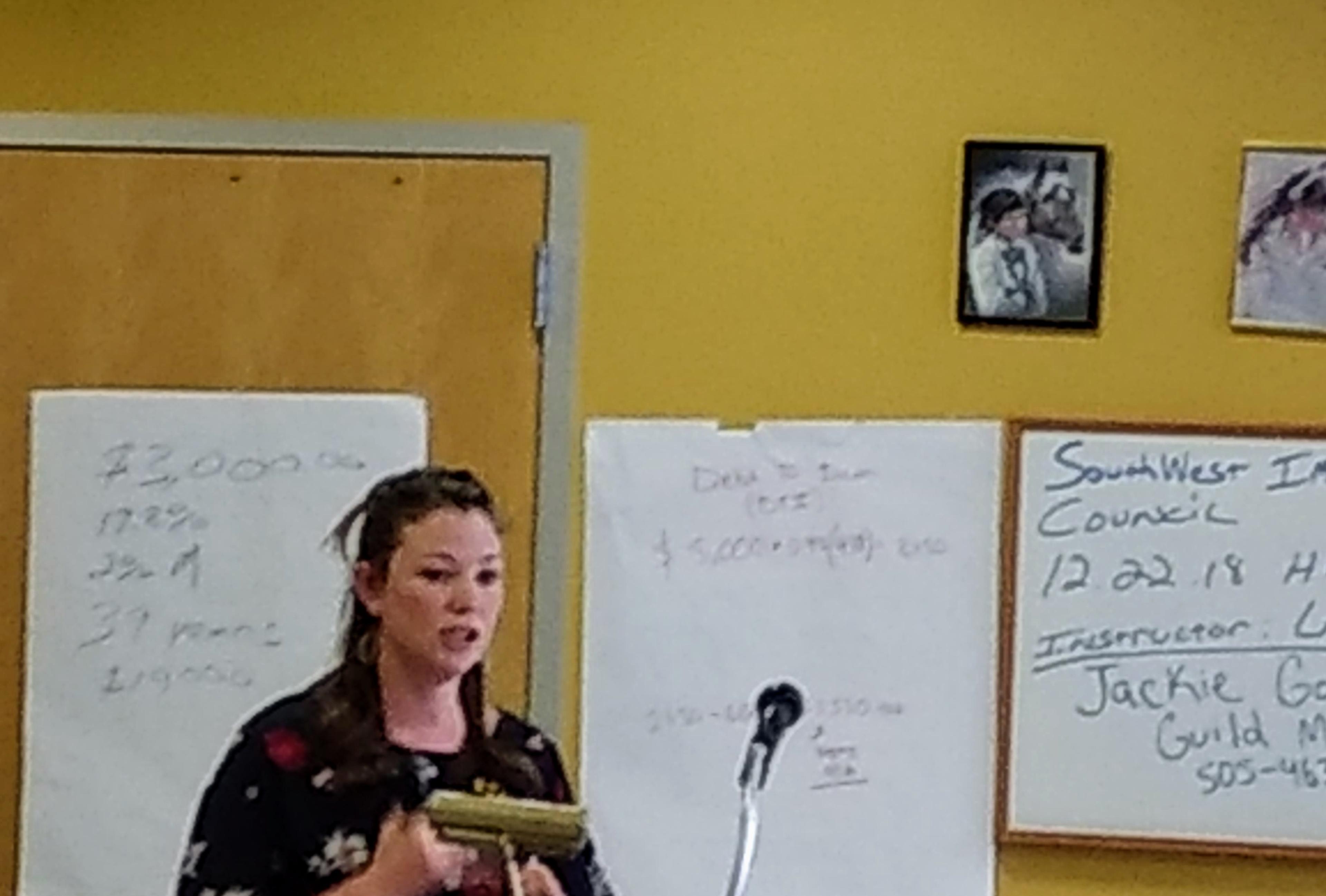While some of you were power-shopping at the mall, 40 would-be homeowners crowded into a classroom at the Westwood Community Center to grapple for six hours with FICO, APR, CIC and more dizzying letter groupings.
"WTH?" a jokester lobbed from the back of the room.
Most of the people in folding plastic chairs at folding plastic tables were there because the Colorado Housing and Finance Authority -- CHFA, pronounced "chafa" by those in the know -- required it of them to get loans or down payment support. I went after two Denverite readers contacted me to describe frustrations they'd experienced trying to buy affordable homes in Denver. In talking to experts at CHFA and elsewhere about the two women I'd come to think of as "my" aspiring homeowners, I heard again and again that I would better understand what they were facing if I took one of these free classes for first-time home-buyers.
Denver RE/MAX agent Kerron Stokes told me he had had clients emerge from the classes, which follow a CHFA curriculum, real estate experts.
"It's empowering," he said.
I ended up taking a class that housing counselor Lance Guanella leads as one of the services of the SouthWest Improvement Council. Nonprofits, local housing authorities and municipalities offer first-time buyer classes across Colorado.

Guanella is a former real estate agent and property manager and current deputy executive director for SWIC -- say "swick" for Southwest Improvement Council -- which supports home ownership and affordable housing to help strengthen communities. SWIC started in the 1980s as a neighborhood effort to clean up Westwood yards and alleys, remove graffiti and support the elderly. The nonprofit, which has offices at the Westwood Community Center, later became a landlord, renting units at below-market rates. Its housing initiatives include a HUD-approved counseling service for home owners facing foreclosure as well as the first-time buyer courses that Guanella leads at least once a month.
"There's a lot of confusion out there because there's various numbers for various programs," Guanella had told me. "There's a lot of misinformation out there."
Just days before my class, a report from Denver's city auditor revealed an unexpected source of some of the confusion that Guanella had described. Auditor Timothy M. O'Brien said in a Dec. 20 report that his staff had sampled 23 transactions in a program that reserves about 1,400 homes in the city to be sold below market rates to buyers who met certain criteria.
The audit found that none of those 23 buyers had had their incomes verified to ensure they could afford monthly payments.
Instead, staff from the Office of Economic Development, which stewards the affordable housing program, looked only at whether the buyers' earnings were below the maximum percentage of area median income -- among those various numbers Guanella may have had in mind -- permitted for the homes they wanted, not whether their monthly spending on mortgages and other housing costs would be a burden.
Theoretically, you shouldn't be spending more than a third of your income on housing. But this is reality.
The city's 2002 Inclusionary Housing Ordinance stipulates that buyers of the homes in the program can spend no more than 30 percent of their gross income on housing. For decades across the country, that 30 percent has guided discussions about affordability. Months before O'Brien's report was released, I had heard questions from my aspiring homeowners that indicated what the audit had found -- that the 30-percent standard was not being applied uniformly. I asked OED's newly appointed chief housing officer, Britta Fisher, about this in October. She said the 30-percent rule was spelled out in city regulations and then attributed any confusion to communications issues that she said were being addressed.
In its response the day the audit was released, OED credited Fisher with discovering over the summer that the 30-percent rule had not been applied, though it did not say in how many cases. OED added that "application of this standard is now included in the income verification process for all affordable housing applicants."
The auditor found several other problems with OED's stewardship of affordable housing in Denver, including issues revealed by OED before the audit regarding some 1,400 homes that should have been sold only to people earning below the area's average median income and meet other requirements. More than 300 homes slipped out of the program because covenant restrictions on their prices were not adhered to when the original buyers sold them.
OED promised practices would be tightened. But it also was considering whether the 30-percent rule might need loosening. OED added in its statement that staff was "actively reviewing a possible revision to rules and regulations to determine best practice" in this area. Nationally, experts have debated whether the 30-percent rule is so rigid it is denying some people an opportunity to buy and build wealth.
One of my aspiring homeowners, a single parent with a master's degree who works as a museum archivist, is among the many people in Denver who would be considered housing burdened because she is spending more than 30 percent of her income on rent. From her perspective, while she might be overburdened as a buyer, at least she would also be building equity. Lenders can be willing to give mortgages with payments that eat up more than a third of a buyer's income. The residential real estate website Trulia recently estimated that a typical starter-home buyer in Denver should expect to pay 55.3 percent of their income on a monthly mortgage payment. But OED housing officer Fisher told me city officials "can't just necessarily accept what any lender is willing to underwrite."
Overburdened buyers risk falling behind on their mortgage payments and losing their homes. That's a threat to the city's affordable program because the Denver covenant restrictions meant to preserve affordability are generally removed in foreclosures in which the bank or other entity that held the first mortgage acquires the property. According to OED figures, 263 of the 1,400 or so homes in the affordable program have been foreclosed since 2005, most of them between 2008 and 2013, during the height of the recession.
Foreclosure was a big topic back in the home buyer classroom.
It was actually a multipurpose room where just days before, for a holiday meal for the elderly, the tables and chairs had been arranged as if in a restaurant. A Christmas tree festooned with ornaments and lights still stood in the back corner.
At one point, a hush fell over the room as instructor Guanella described a man who had reached out for help too late and was waiting for sheriff's deputies to arrive and start removing his furniture from a house the bank now owned. The mood lightened when Guanella added:
"None of that's going to happen to any of you guys. That's why we wanted you to take this class."

He and fellow instructor Jacquelyn Gonzales, a loan officer, repeatedly stressed the need to communicate and stay ahead of possible problems. Perhaps the man awaiting the deputies had lost his job. Anyone who fears falling behind should contact his or her lender before missing that first mortgage payment to work together on a period of forbearance or a new payment plan, Guanella suggested.
Guanella was optimistic about the Denver affordable housing program that has received so much attention. He told the class he believed OED would fix the problems that have been plaguing the program.
"It's a good way to get into a home," he said.
When Guanella had arrived to open the doors at 8 a.m., a knot of students was already waiting, determined to get a seat in 9 a.m. class. I yielded my seat at a table to someone who wasn't just observing, instead installing myself in the corner with the Christmas tree. It was the last class of the year anywhere in the area. Many of the students were already far along in their purchases that relied on CHFA grants or loans and needed to complete the class to complete their transactions. The class is free and open to anyone, not just people receiving CHFA help.
In their report earlier this year, "Exploring Colorado's Housing Affordability Challenges in All of Their Complexity," researchers Jennifer Newcomer and Phyllis Resnick noted that since 2011, Colorado wages have increased 11.4 percent while the cost of homes for sale has increased 48.7 percent and rents 46.2 percent. That means a range of people, even those earning at or close to the area median income, need help buying in the Denver area.
The pent-up desire to buy is significant.
A survey by housing search service Apartment List found that 87 percent of Denver renters who are millennials -- a generation with student loans to consider among other expenses -- planned to one day buy a home, but just 5 percent expect to do so within the next year, while 28 percent expect to wait at least five years. Of the Denver millennial renters who want to buy one day, 47 percent had no down payment savings, while just 12 percent had saved $10,000 or more. Apartment List estimated that 83 percent of Denver's prospective millennial home buyers will need more than two decades to save a 20 percent down payment on a median priced condo in their area.
Courses like Guanella's offer information on down payment assistance from entities such as CHFA and the Colorado Housing Assistance Corporation.
"We want you to be a sustainable homeowner," Guanella said, directing students to web sites offering tips on improving credit and paying down debt in order to be in the best position to buy.
Gonzales, the pithy partner of the pair, urged would-be homeowners to keep their savings and their credit scores up so that any debt they took on would be manageable.
"We have to let math be our guide," she said. "It's the only thing that makes sense in this crazy world."
The course was by turns a workshop on personal finance, a math lesson, an exercise in defining lending terms -- FICO, or Fair, Isaac and Company, is a credit score service; APR, or the annual percentage rate, is the cost to you over the term of the loan; CIC, or common-interest communities, is another way of saying HOA.
Even civics came up -- Guanella and one student digressed briefly into a discussion of the legality of property tax initiatives. Participants were for the most part on topic and engaged, even those who had been through the course before.
According to IRS rules, a first-time home buyer isn't necessarily someone who's never owned a home. It's someone who hasn't had ownership interest in a home in the past three years. James King had just sold the first home he bought with CHFA help in Thornton and was in class Saturday in preparation for buying a Brighton home. The operations manager for a moving company was glad in particular for a refresher on loan estimate and closing disclosure documents, samples of which were included in a class packet that also had a 25-page course outline.
"These two sheets are the hardest," King said. "You'll understand them better with this class."
Miquel Irby said: "I'm glad they give us paperwork, because I'd never remember all these little letters."
Irby, who works remodeling homes, said he had taken the class two or three times over the last seven years of stop-start house hunting. He and his wife were initially discouraged because they did not see anything they liked. When they tried again after a few years, they found prices too high. He has found the market calmer and was planning to move from a rental in Montbello to his own home in that neighborhood. The RE/MAX National Housing Report for November put Denver's median sales price at $390,00, up 5.41 percent from November 2017, but down 2.24 percent over the previous month.
"I'm tired of building someone else a nest egg and not building my own," Irby said.
I don't know whether, as real estate agent Stokes predicted, I emerged from class an expert. But I saw the kind of determination that sustains those pursuing the dream of owning a home.












